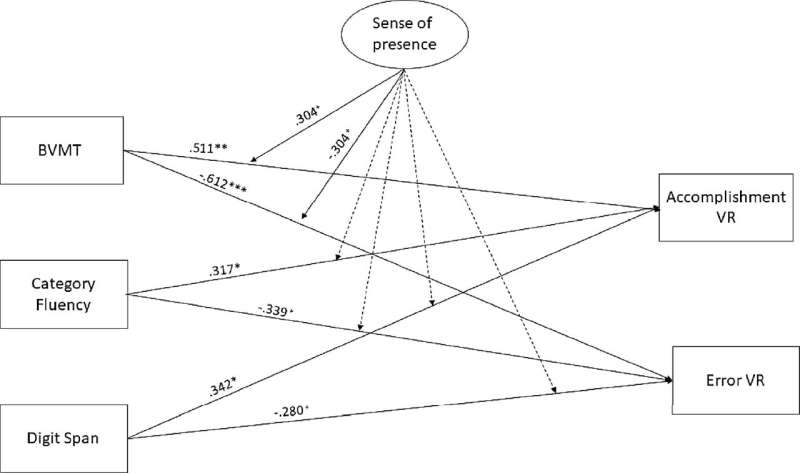This article has been reviewed according to Science X's editorial process and policies. Editors have highlighted the following attributes while ensuring the content's credibility:
fact-checked
peer-reviewed publication
proofread
Virtual reality study reveals link between sense of presence and cognitive abilities

A study published in Scientific Reports has shed light on the intricate relationship between the sense of presence in virtual reality (VR) environments and cognitive abilities. The study, titled "The role of sense of presence in expressing cognitive abilities in a virtual reality task: an initial validation study," was conducted by a team of researchers coordinated by Dr. Andrea Chirico and marks a significant advancement in our understanding of how immersive technologies can influence cognitive functions.
The research team, which includes Prof. Antonio Giordano, Prof. Fabio Lucidi (Sapienza University of Rome), Dr. Luigi De Pietro (CNR ICAR, Italy), and others, set out to investigate the extent to which the sense of presence—the feeling of being "inside" a virtual environment—impacts an individual's cognitive performance. By employing advanced VR technology and designing a range of tasks to test cognitive abilities, the researchers were able to gather valuable insights.
One of the key findings of the study is that a stronger sense of presence is positively correlated with enhanced cognitive abilities. Participants who reported a heightened feeling of presence in the virtual tasks demonstrated improved performance in various cognitive domains. These domains include memory, attention, problem-solving, and decision-making.
"This study opens up new avenues for understanding the relationship between virtual reality, cognitive function, and human perception," said Dr. Tommaso Palombi, the first author of the study. "Our findings suggest that the sense of presence can play a pivotal role in shaping how individuals engage with cognitive tasks in virtual environments." Dr. Giordano concluded.
The study's methodology involved a diverse group of participants engaging in carefully designed VR tasks while their sense of presence was measured and analyzed. The results provide initial validation for the hypothesis that the sense of presence significantly impacts cognitive expression in virtual reality settings.
Dr. Giuseppe De Pietro, co-author of the study, noted, "Our research underscores the potential applications of VR technology in cognitive training and neurorehabilitation. As VR becomes more integrated into various fields, including health care and education, understanding its impact on cognitive abilities becomes increasingly important."
This study serves as a foundational exploration of the link between sense of presence and cognitive abilities in VR environments. The findings pave the way for further investigations into how immersive technologies can be harnessed to optimize cognitive performance, with implications across various domains.
More information: Tommaso Palombi et al, The role of sense of presence in expressing cognitive abilities in a virtual reality task: an initial validation study, Scientific Reports (2023). DOI: 10.1038/s41598-023-40510-0




















